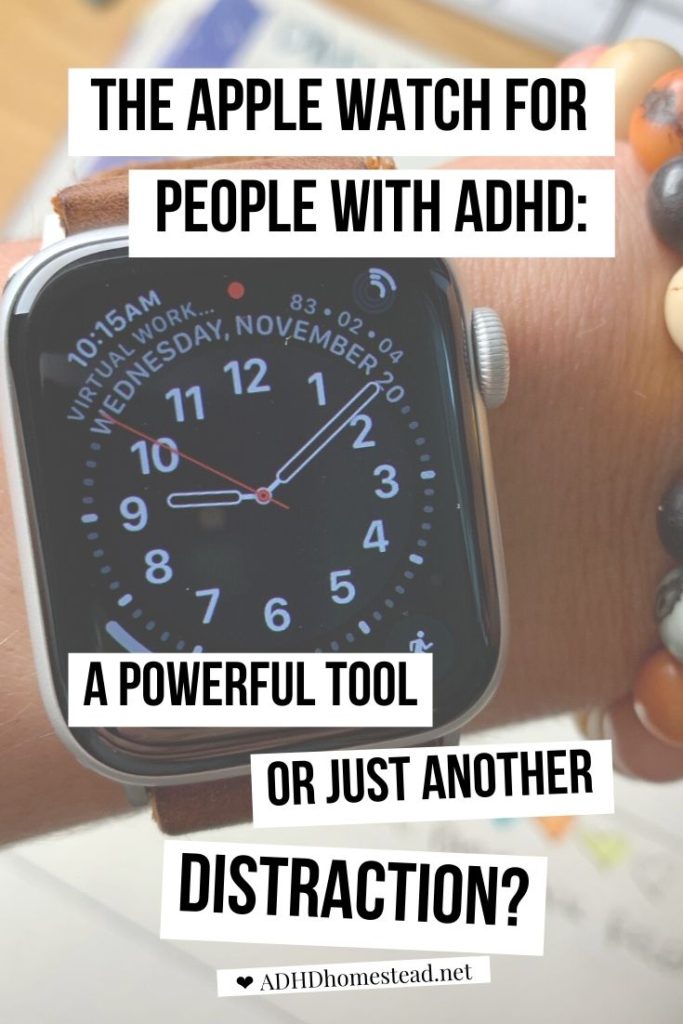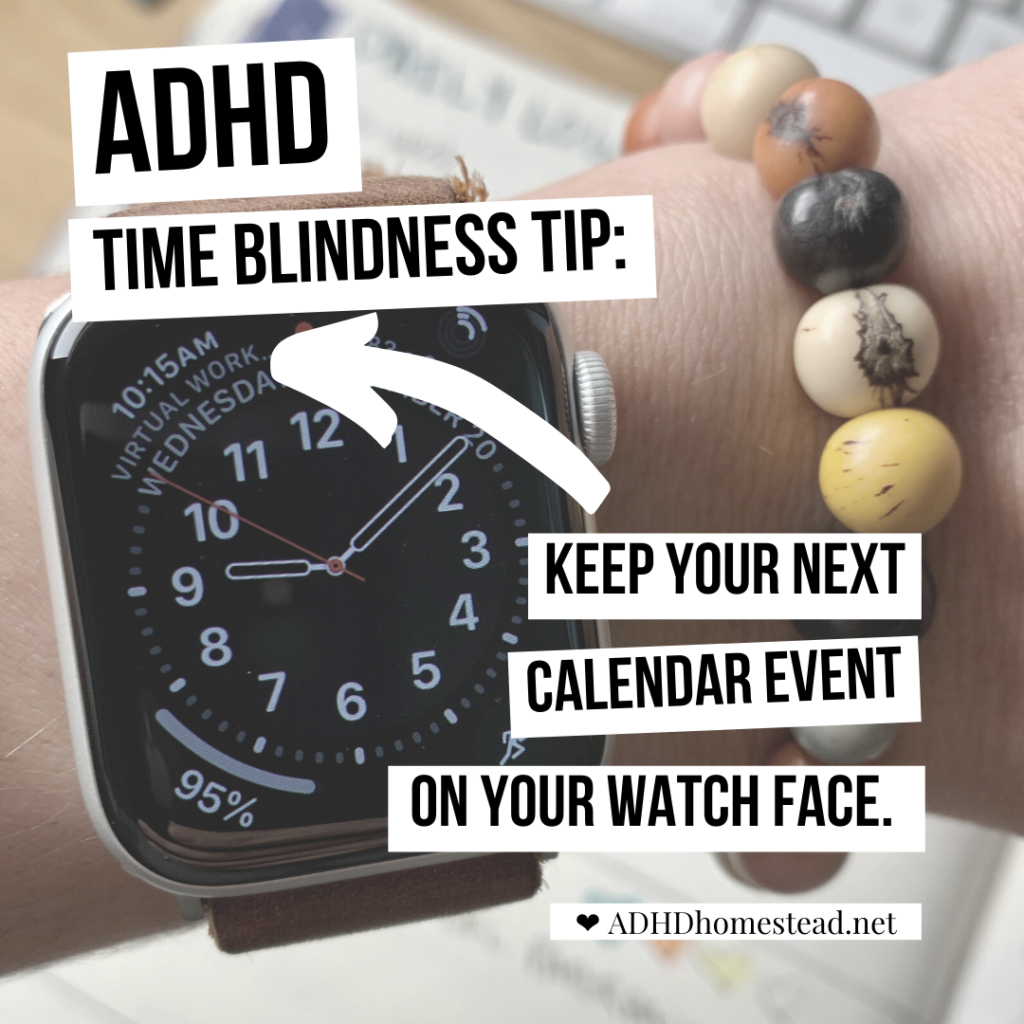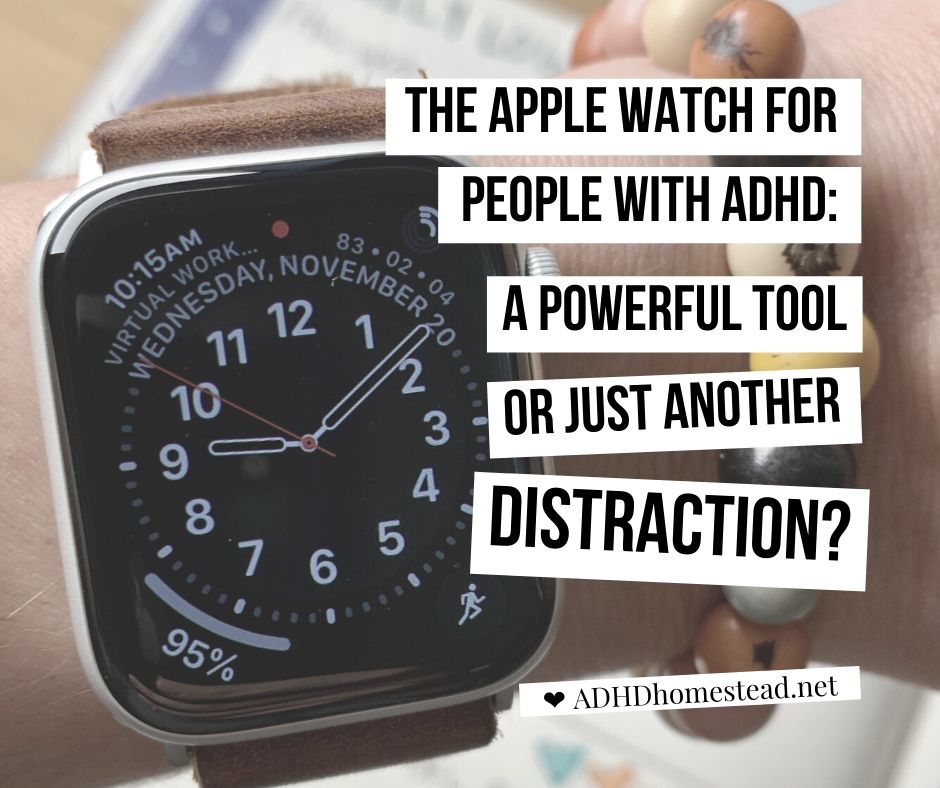If you’d asked me how I felt about an Apple Watch a few months ago, I would’ve told you I don’t judge anyone for owning one. I would judge myself for owning one, though.
It’s not that I didn’t want an Apple Watch. I have ADHD and I like shiny gadgets. This particular gadget triggered my hangups around spending money and treating myself. It seemed both frivolous and extravagant. Something I’d feel embarrassed to wear around my parents.
Then I read an article about spending less time with your smartphone. The author claimed a smart watch was a powerful tool to disconnect.
Now that caught my interest.
People with ADHD have a smartphone problem
As I’ve said in my book Order from Chaos and on this blog, I support people with ADHD using smartphones. I tried to give mine up once, to get rid of its distractions. I quickly learned how much it helps me stay organized. It’s the ultimate Swiss Army knife.
However, it also encourages distractions and wasted time. The only effective remedy I’ve found has been to remove it from arm’s reach as often as possible. As much as I rely on my phone, I also try to stay away from it.
That means I underuse its beneficial features as much as its distracting ones. I often miss vibrating alerts, but I avoid noisy alarms because I find them disruptive. I don’t use calendar alerts to remind me to leave for appointments because I can’t guarantee I’ll see them in time. If something seems like a good idea but would require me to carry my phone more often, I usually won’t do it.

What I’ve gained from the Apple Watch so far
Eventually my curiosity got the best of me. I wanted to know: would the Apple Watch have the paradoxical effect that article-writer suggested? Would it help equalize my hot-cold relationship with my phone?
To my surprise, it has. Over the past two months, I’ve noticed several big changes in my behavior:
- More consistent bedtime. I set a recurring alarm titled “Get ready for bed” for 10:15 every night. If I’m scrolling mindlessly through my phone because I feel too tired to get ready for bed, it provides the motivation I need. It also makes bedtime feel more concrete. When I’m deciding if I should watch one more episode of a TV show, I think about whether it will end before my bedtime alarm goes off. While I don’t leap into bed promptly at 10:15 every night, I’ve gone to bed consistently earlier than before I bought the Watch.
- Increased use of timers and alarms in general. I don’t like repetitive sounds. I also keep my distance from my phone late in the evening or while I’m working. This means I only used my phone’s timer and alarm apps when I truly needed to. The Watch alerts me with a vibration on my wrist. I find this much more agreeable, especially in situations where I don’t want to call attention to my alarm.
- More time away from my phone. I set my Watch to deliver very few notifications. Aside from the activity, timer, and alarm apps, it will only bug me if my phone actually rings. I’ve gone on several walks without my phone, confident that I can be reached (or reach someone) in an emergency. I stay in the moment so much more when I don’t have the option of pulling out my phone to snap a picture only to get distracted by notifications.
- Fewer missed calls. I’ve gotten into trouble with various people in the past for missing calls and forgetting to return voicemails. Now my Watch alerts me when someone’s calling, even if I’ve misplaced my phone. It also gives me the option to answer on speakerphone if my phone isn’t around.
- Renewed yoga practice. When I bought the Watch I promised myself I would try not to obsess over closing my activity rings. I’ve mostly succeeded. However, if I see I only have 10 minutes left to close my exercise ring at the end of the day, I’ll use that time to do a calming before-bed yoga practice. A daily yoga practice is so beneficial for me, but I’d fallen away from it for over a year. I’ve only gotten back into it since getting the Watch.
- More awareness of my calendar. I look over my calendar in my Bullet Journal every morning. However, I appreciate the way my Watch keeps upcoming events in front of my face. Every time I check the time, I see the next event on my calendar. My Watch vibrates when it’s time to get ready to leave for appointments. Overall I have a much better grasp of what’s on my immediate horizon.

Yes, my phone can do (most of) this too
The Apple Watch can feel extravagant because it doesn’t do anything my phone can’t do. So what if I find it disruptive and embarrassing to have my “time for bed!” alarm ring my phone? Part of me resents the idea of spending hundreds of dollars on a crutch to make my good habits easier to maintain. I could just suck it up and do it like everybody else.
Except I can’t — or at least I won’t, and that ends up being the same thing. I won’t force myself to have more self-control with my phone. I won’t set noisy alarms and timers to keep myself on track throughout the day. My husband does that with his phone and it drives me nuts. I won’t remember to check my phone for calendar reminders before a 9:30 a.m. meeting. When you have ADHD, sometimes the best thing you can do is accept there are times when you won’t do it.
Because when you accept that, you’re free to design a new solution. For me in this case that new solution is a gadget so extravagant I’m a little embarrassed to own it. As skeptical as I was at first — and as much as I still don’t want to admit I like it — the Apple Watch actually seems like a great tool for people with ADHD.
How about you? Do you have a smart watch? How has it helped (or failed to help) you stay organized?
Hey there! Are you enjoying The ADHD Homestead?
Here's the thing: I don't like ads. I don't want to sell your attention to an advertising service run by the world's biggest data mining company. I also value my integrity and my readers' trust above all, which means I accept very few sponsorships/partnerships.
So I'm asking for your support directly. For the cost of one cup of coffee, you can help keep this site unbiased and ad-free.
Below you will find two buttons. The first lets you join our crew of Patreon pals and pledge monthly support for my work. Patrons also have access to my Audioblogs podcast. The second takes you to a simple donation page to pledge one-time or recurring support for The ADHD Homestead, no frills, no strings. Do whichever feels best for you!

